Published Aug 13, 2018
Trek Directors' School: Robert Picardo
Trek Directors' School: Robert Picardo
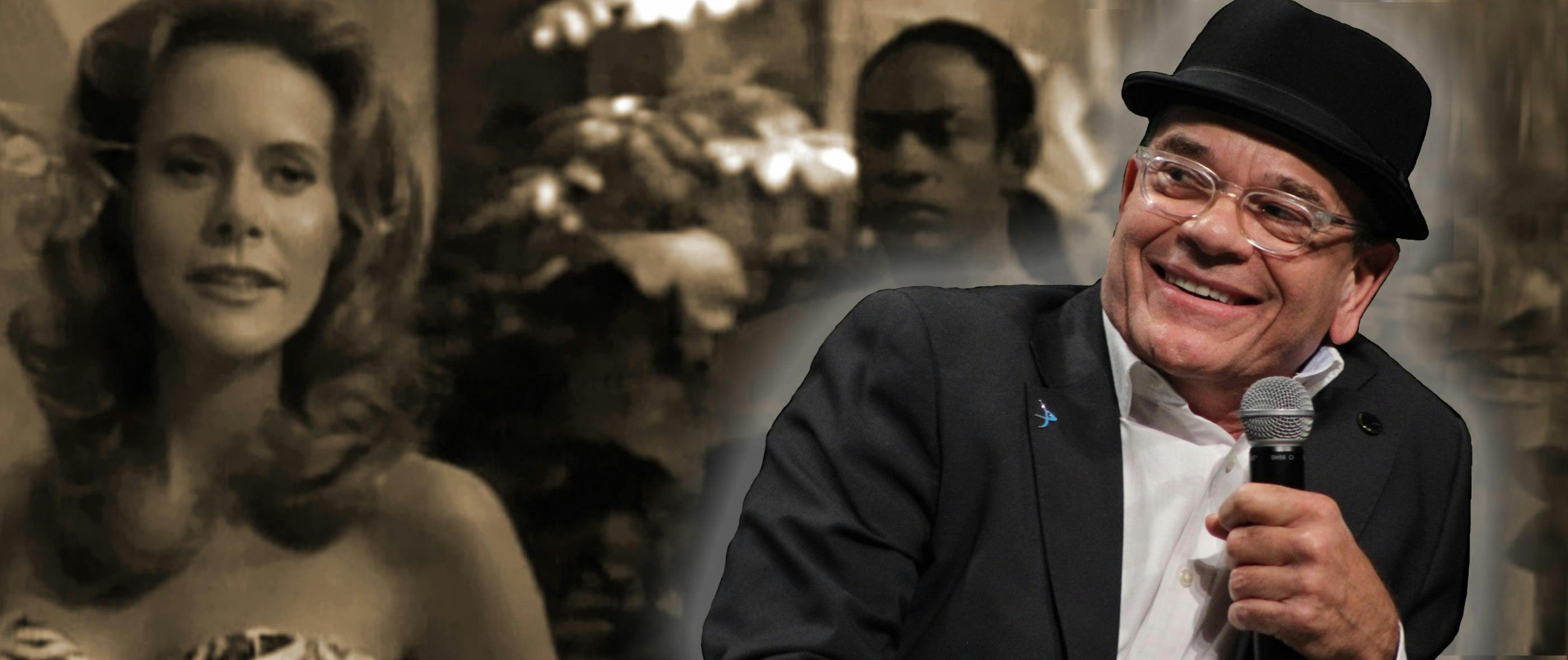
Star Trek fans, when they think of Voyager actors-turned-directors, immediately and understandably reference Robert Duncan McNeill and Roxann Dawson, since they’ve gone on to stellar careers as directors. But let’s not forget that Robert Picardo also got in on the action of calling, “Action,” as he directed the episodes “Alter Ego” and “One Small Step.” To prep for his episodes, Picardo – like all of his fellow actor-directors -- participated in Trek’s unofficial directors’ school. StarTrek.com recently chatted with him about his determination to direct, his experiences making “Alter Ego” and “One Small Step,” why he didn’t pursue directing thereafter, and how a horror movie just might find him back in a director’s chair. Here’s what he had to say…
At what point did you realize you wanted to direct Voyager?
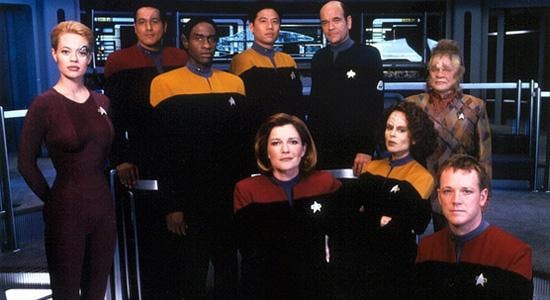
I think I came in with that ambition. I’d trained to direct on China Beach, which was the last major series role I had before Voyager. China Beach had a shortened final season and I’d gone through the training process and trailed a couple of directors, and never got the opportunity. So, it was in the back of my mind when I was cast on Voyager. I'm sure I wasn't the first actor to ask. Robbie was probably the first. Robbie and Roxann and I were in the pipeline, I think, visiting editorial, sitting with the editors, watching the different directors work. We were in the informal training process that Rick Berman very graciously offered the actors who expressed the desire to direct. Tim (Russ) as well.
What did you learn from watching the editing process?
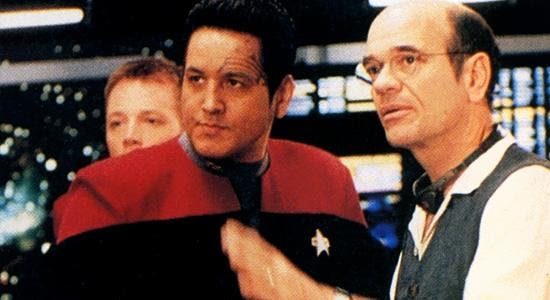
We had several editors, and they were always welcoming, a pleasure to be around, very helpful in explaining if there was a particular angle or a choice that the director made that you didn't quite understand. They’d tell you why they chose one take versus another. The really helpful thing about going to editing is you see every decision the director made on the set. You’d see his setup. You’d see his coverage. You’d see all the building blocks to make the show.
Who were the directors you shadowed?
Most of the regular directors were happy to have the actors watching over their shoulder. A Star Trek actor directing might get a slot over a regular director, but they were gracious to us and maintained relationships with us as actors and people. It would’ve been an unfortunate situation if they’d not been so gracious. Rick Kolbe was great about being shadowed. He had a very specific style. He liked to do closeup coverage on a long lens that gave a very specific look on the bridge, which was cool. It was harder for your focus puller, and it created other challenges, but it gave it a more immediate and exciting look. Les Landau was very helpful and really gracious.
What was the hardest aspect of directing to grasp?
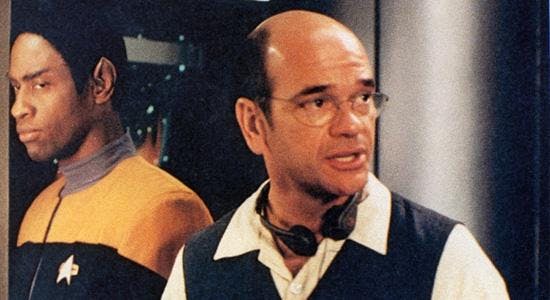
Honestly, the reason I didn't personally pursue directing is that the whole experience of being in charge, and I know this sounds crazy, was not appealing to me. I love being an actor and I set out to do that with my life. I learned a lot from directing. I learned about how other actors work by having to watch them that carefully. I consider myself a director-proof actor. I don't argue with directors. I feel my job is to do it entirely on my own and when the director says, "Do this" or "Do that," I never argue. It’s like I have our universal translator built in my head to listen to directors, and if they give me a direction that I don't understand I say, “Thank you very much. That's a great note." Then, I try to figure out what they meant and make the adjustment, and if I don't agree with them at all I just say, "Thank you. That's great. That's very helpful," and I just do what I want. Most of them think you took their direction because you were gracious when you received it. This is not a mystery. All actors know this.
What I didn't care for in directing was the 150 questions you get asked every hour by every different discipline on the set. Wardrobe asks a question and the set decorators are asking something about the scene later in the day or about the set you never got to see because it wasn't completed when you started in pre-production. Some people get exhilarated by that feeling of intensity of the experience of being a director. I liked the usual down time I had as an actor, where I could look at the next day's work or do whatever I wanted to do. As a director, your brain is in overdrive for the 15- or 16-hour day. If I’d directed at an earlier stage of life, if I had done it on China Beach in my thirties, I probably would’ve continued directing, but beginning the process in my middle-forties on Star Trek, I just thought, “I don't know that I'm ever going to relax and enjoy this.” I proved to myself that I can direct, but I ultimately thought, “What am I going to be happier doing?” The answer, for me, was acting.
Your first Voyager episode as a director was “Alter Ego.” What comes to mind when you think of the experience of making it?

I was very happy with the work Tim and Garrett (Wang) did, and our main guest star was Sandra Nelson (as Marayna), and she was terrific. She had a very vulnerable quality to her. I remember she had beautiful eyes. I even remember that her audition was really good. Sandra was lovely to work with. And I remember I directed a scene or two that I was in, particularly that luau with the two ladies. I didn’t want to go too crazy with it. I was afraid of the Holodeck stuff because I really was worried it was going to look like The Love Boat. But people seemed to like that moment. And they liked the episode, for the most part. It was a pretty good first episode for me, I think, but I liked the second one better.
And that would be “One Small Step." Why did you like it better?
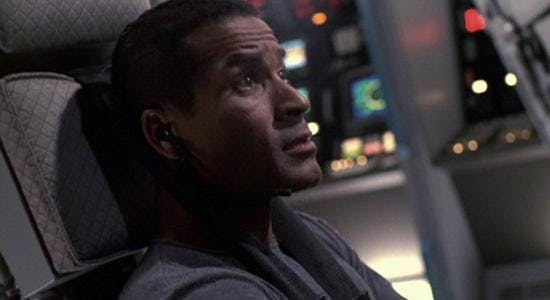
When you direct a show, especially as a cast member, you’re assigned a story and you tell it as best you can. In my two episodes on Voyager I ran the gamut of experience because I went from a story that, for a number of reasons -- other than the kissing of the two beautiful girls in the Hawaiian outfits and the bikini tops -- wasn't a whole lot of fun to direct, to “One Small Step,” which had such a great emotional arc. I was excited to tell that story. Marvin Rush, our wonderful DP, was an asset to every director. He really helped fake some of the weightless shots. He had this great idea about putting someone on a camera dolly, just scissoring the dolly up and shooting the top of the actors’ bodies, so it looked like it was just floating. What he did to fake weightless on a budget and short time frame wasn’t easy to do.
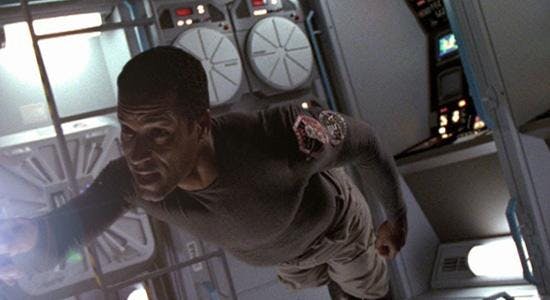
Anyway, “One Small Step” was almost prescient. It was the only Voyager episode that really paid homage to NASA and to the beginnings of human space exploration. Star Trek was set so far in the future we didn't so much hear about the 1960's and real space travel, but "One Small Step" was very much about the shoulders of the giants we stand on or that we have stood on. And the story was about a mission to, if memory serves, Mars. I had a terrific, terrific guess star, Phil Morris. I grew up watching his dad on Mission: Impossible. Phil is a terrific, terrific human being; couldn't be a harder working, more committed actor. Also, he was in incredible physical shape, which helped faking the weightlessness. Jeri Ryan had a great part in that episode, too, some nice, touching moments that were good to see for a character that usually had such a limited emotional palette.
It’s been years since you’ve directed, but word is you may direct an upcoming project…
That’s true. I’m developing a horror script with a friend and he wants me to direct that. I definitely want to act in it, and when we finish tweaking the script, I’ll decide then how much I really feel like I'm the guy to tell the story. It’d be fun to go back to directing knowing that it’d just really be for a lark on a low-budget movie.

